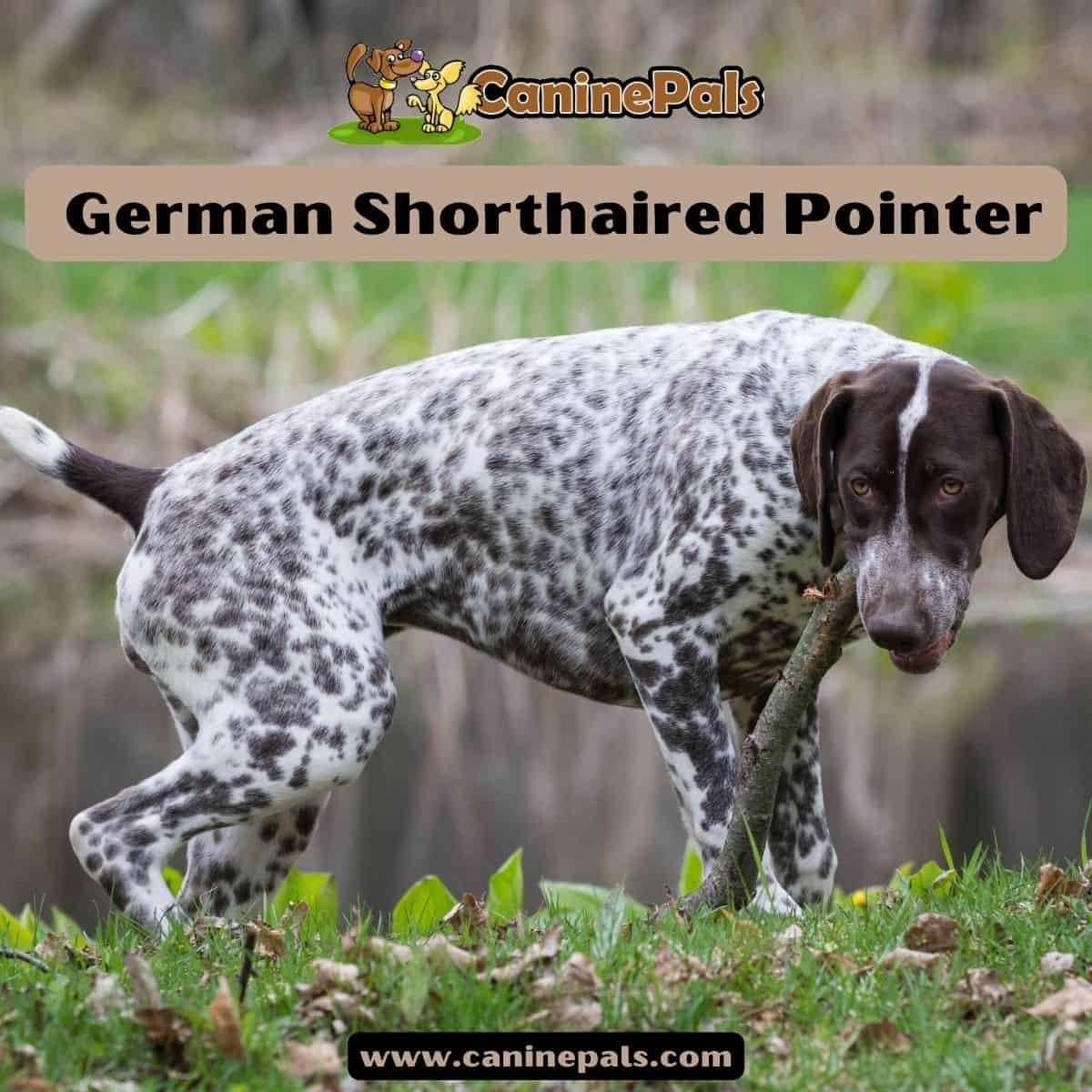Last Updated on October 25, 2022 by Denise Leo. Post first published on October 25, 2022.
The most frequently asked question is, are pointers hypoallergenic, or are German shorthaired pointers good for allergies? In the following piece, we will cover all these aspects of German shorthaired pointers and how you can keep them at home.
Are German Shorthaired Pointers Hypoallergenic?
GSPs are certainly not hypoallergenic, but the correction is that no such dog is truly hypoallergenic as all of them shed some hair and skin particles called dander. And the dander can cause some kind of allergic reaction in those prone to allergies, but some dogs cause lesser allergies, but none is 100 percent hypoallergenic.
German shorthaired pointers are double-coated breeds that have two short coats. They have a thick and short top coat, and beneath that, they have water-resistant undercoats, which make them shed more. However, GSPs are moderate shedders that only shed twice a year and aren’t the most allergenic dogs out there.
German shorthaired pointers, known as GSPs, are among the most popular dog breeds for outdoor activities and adventures. GSPs are very friendly, obedient, and energetic dogs that they bred for hunting purposes. These dogs have a well-muscled body with solid thighs and can eagerly become more muscular if given the proper training and exercise. Pointers are a versatile sporting breed that is great for hunting; these types of dogs have water-resistant courts that make agile hunters perform terrifically in both land and water fields.
When going out to buy a dog, everyone wants to get on board a breed that is playful, loyal, friendly, and easy to train and groom. German shorthaired pointers are those versatile sporting breeds that can hunt and live as great family dogs. They can sometimes become challenging to handle for new owners, but once they settle down, you won’t like having any other pet.

History
German shorthaired pointers are the most obedient and well-mannered hunting dogs; they are known for their high performance in dog services and sports like dog diving, agility, and obedience. This breed can survive well in outdoor and indoor atmospheres, but their best performance is indoors. This sleek and speedy dog breed is full of stamina and famous for its endurance. They have been honored for having great smelling sense and courage to fight big animals.
This famous breed came into being during the 18th century after German hunters spent generations cross-breeding several hunting dogs to get this breed. Many German tracking dogs contributed to the expansion of this breed, like English pointers and Arkwright pointers.
However, it’s not known which two breeds produced GSP. Still, it seems that GSPs are the descendant of Spanish pointers and German bird dogs. After going through several phases of evolution, the breed got official recognition from American Kennel Club in 1930. GSPs breeding was highly affected by the Second World War, and the breed became rare; by the war’s end, the German breeders worked extensively with the limited gene pool to rebuild this beloved breed.
GSPs are best known for working with intelligence and law enforcement agencies to track illicit material and criminals. This breed assists the armed forces when they perform big missions; their outstanding sense of smell makes them one of the favorites of the armed forces as they help them sniff out explosives.
Besides their exceptional hunting abilities, German shorthaired pointers inspired many writers to celebrate this breed in their writings; one such display in a famous mystery series Spencer in which the famous detective had three German shorthaired pointers.

Appearance
GSP is medium-to-large-sized dogs with short and flat coats that are water resistant to keep them warm in winter. Pointers are known for their unique combination; the coats of this beautiful breed are usually liver (dark brown) in color with black or white spots on it, or in some cases, they can be in solid colors, but commonly they are liver with spots.
They have a large nose, big almond-shaped eyes, and dark-colored floppy ears, and the unique thing about pointers is that the color of their nose always matches the coats. The male GSPs are 55-70 pounds in weight and are generally 23-25 inches tall, while the females usually reach 23-25 height and weigh around 45-60 pounds.
Temperament
GSPs are one of the most friendly, playful, energetic, and intelligent dogs. There are hardly times when you would find this breed not doing any activity. Their hunting history makes them an incredibly free-spirited breed that likes wandering around if not trained to live under the fence.
The good thing about these pointers is they are quick learners and easy to train. They are also kid and dog friendly and love playing with kids, but it’s suggested not to leave this breed unsupervised with kids. Pointers generally welcome strangers and don’t bark excessively but alarm their caretaker of any strange activity going around nearby.
Moreover, GSPs are working dogs as they get training to do hunting jobs, so they don’t like sitting idly. If these dogs are not kept busy with activities, they can become aggressive and furious. So it’s suggested to always occupy their mind with plenty of activities, exercises, and interactive toys, so they don’t get bored. These dogs crave for purpose, and if they don’t get one, they start barking and chewing.
This breed can become challenging to handle for impatient owners when they are untrained and babies. Pointers are very sensitive and like living in a positive environment to get trained; they are not happy when left alone, so we recommend that only those caretakers keep these dogs who stay out for long.
Living Atmosphere
As we have discussed, GSPs are sporting dogs who need a spacious area to run and play; that’s why these dogs can’t live in confined places like apartments and condos. GSPs possess boundless energy; they need owners with ample space to engage them in different activities. GSPs are great performers as organized athletes, but even if you don’t train them for competitive agility, they can happily become your companion for family adventures.
A positive atmosphere encourages them to do good, so always treat your pointer delicately and praise them for all their good deeds because this breed gets disappointed with the harsh and commanding behavior of the owner. Even treating them with some delicacy can also do wonders.

Care Tips for German Shorthaired Pointers
GSPs are easy to groom and clean; their nails need trimming at least once a week, while their ears also need to be checked for cleanliness. Pointers have small coats that need regular brushing with the right tools.
This breed relies heavily on its natural oils for skin protection; they only require occasional or once-a-month bathing and shampooing. A German shorthaired pointer sheds hair only twice a year in fall and spring; they need extra brushing with a firm bristle brush during this time.
GSPs need considerable food and water as they are active mid-to-large-sized dogs and might get dehydrated if they don’t get enough water. The vigorous exercises require them to eat high-quality dog food in reasonable portions divided into meals a day. But your pet’s diet should have a proper balance so they don’t get obese.
The Lifespan of GSPs and Their Health Issues
German shorthaired pointers are generally healthy dogs; they live for a good 12-14 years, which is a healthy lifespan. Like any other mid-sized dogs’ pointers also face several health conditions, progressive retinal atrophy, heart issues, skin disorders, and hip dysplasia. Pointers are also prone to gastric problems like excessive bloating and vomiting, which can become life-threatening if not treated promptly. Hence, scheduling check-ups with your veterinarian for all health-related issues is better.
Hunting dogs also quickly get fungal and bacterial infections on their open wounds and cuts that the contact due to scratching against bushes as they go out in the woods for hunting sessions. Here are a few other diseases commonly found in a German shorthaired pointer.
Von Willebrand’s Blood Disorder
This disease is a blood disorder that influences clotting due to the shortage of von Willebrand’s in the blood. The dogs that suffer from this disease have typical symptoms of excessive nose bleeding, gums bleeding, and sometimes bleeding in the stool. Fortunately, there are treatments for this disease, and the transfusion can fully cure your pet of von Willebrand’s factor.
Entropion
Entropion is a common eye defect found in most dog breeds; in this disease, the eyelid starts rolling inwards, which causes irritation and injury to the eyeball. Generally, GSPs get this defect at an early age, at six months, and start rubbing their eyes relentlessly. The proper treatment for this condition is surgery.
Lymphedema
Lymphedema is a common disease in dogs that occurs due to an obstruction in the lymphatic system; in this condition, lymph flow gets blocked, resulting in tissue swelling. There is no cure or surgical procedure to cure this condition; you can only improve your pet’s condition by giving them rest and massage on the affected area to improve lymph circulation.
Gastric Dilatation Volvulus
Gastric dilatation volvulus or bloat is a known life-threatening disease in medium-to-large-sized dogs that is caused by excessive rapid eating, drinking and doing forceful exercises after eating. This condition occurs when the stomach gets full of gas, and the dog cannot get rid of it. This condition becomes life-threatening when dogs panic and their blood pressure drops. You should call for immediate medical assistance for help if your dog suffers from this condition.
Is GSPs Good For Allergies?
Well, German shorthaired pointers are not bad for allergies if you can manage the cause of allergies. But it completely depends on how severely allergic you are to dogs. You can always ask your doctor for advice on whether the breed is workable for your type of allergy.
People are generally allergic to dander; you can always reduce the risk of allergies by getting rid of dander and hair by regularly bathing and brushing your pointer, as it reduces the dander’s presence in the house.
Tips to Manage Allergies
If you are allergic to dander and still want to keep a dog in your house, then there are plenty of things you can do to minimize the impact of allergens a dog carries in your house, which include the following:
- Regularly vacuuming your house can help eliminate the dander settling in different parts of your house.
- Mop the areas that can have dander settled there.
- We would also suggest you keep the dogs out of your resting places like the bedroom and other places where you can sleep.
- The easiest way to remove the dander from your house is to groom and bathe the pet outside. Bathing outside will help you secure the house from allergens. It would be better if you did the job wearing masks and gloves.
- An air purifier can be a savior when cleaning the air; try getting one with HEPA filters.
- Always wash your hands and properly sanitize them after touching and cuddling your dog.

Conclusive Thoughts
German shorthaired pointers are an exuberant and full-of-life breed; they can bring liveliness to your household through their active presence and playful nature. Hence to sum it up, we would say that this smart breed is not hypoallergenic, but German shorthaired pointers are not too bad for allergies as no dog is 100 percent hypoallergenic. And if you are living with it, then it’s because you take all the right precautions. You can always live with a German shorthaired pointer harmoniously with having an allergy; it’s just that it’s not very common.
So, if you are keen to include a pointer in your family as a pet, then you can always manage the impact of allergens in your house with the management tips we have shared in this article. However, we can only help you understand a German shorthaired pointer more clearly so that you can decide whether you want to keep one or not. We hope this piece helps you take the right pawsome decision.
Copyright CaninePals. All Rights Reserved.
References and Further Reading:
American Kennel Club German Short Hair Pointer Information


